What Pride Means to Us
Story by:
Published Date
Story by:
Topics covered:
Share This:
Article Content
With Pride Month celebrated nationwide throughout June and San Diego Pride held each year in July, summer at UC San Diego is filled with celebration and commemoration of the LGBTQ+ community and its history.
In honor of these two months of festivities, we asked student leaders who identify as LGBTQ+ to speak about their work with organizations that support LGBTQ+ students on campus, as well as their insights on the question, “What does pride mean to you?”
Meet J Hernandez, Julia Saldivar, V Narredula and Kira Esguerra—four students who are leveraging their unique interests, passions and personalities to foster a spirit of inclusivity and belonging on campus. From struggles to triumphs and everything in between, they opened up about their own personal journeys and how they found a supportive community and a place to call home at UC San Diego.
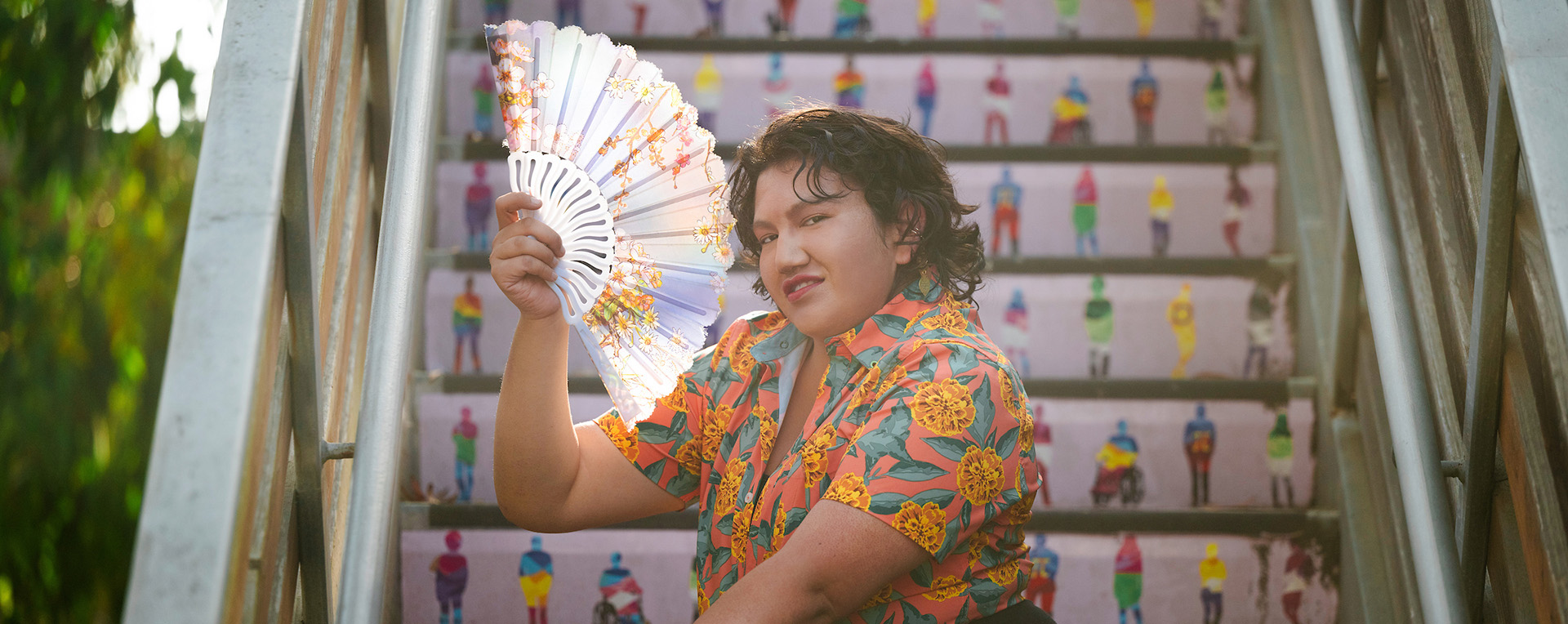
J Hernandez (he/they)
Founder of the Drag Club at UC San Diego. Intern at the university’s LGBT Resource Center. Event coordinator for the Multi-Identity Art Collective on campus. One might find it easy to look at J Hernandez’s accomplishments—paired with their friendly, engaging personality—and assume that they haven’t ever struggled to find a place to belong.
But that’s far from the truth, says Hernandez, who comes from both Latino and Chinese heritage and identifies as transmasculine. They explain that their unique cultural background has shaped their experiences as a queer person.
“Both of the demographics I’m from are prominent here, but I look like neither of them, so I don’t really ‘belong’ anywhere. I think that’s what made me latch on to queer identity,” Hernandez says.
Now headed into his third year at UC San Diego, the cognitive psychology major describes a specific day during his first year when he felt particularly isolated. Headed nowhere in particular, Hernandez began walking across campus from Warren College and eventually stopped, looked up through tear-filled eyes, and saw a sign on the building’s second floor that read “LGBT Resource Center.” He climbed the stairs and walked through the door, unaware of how consequential that decision would be.
“I walked in, sobbing, and everyone embraced me,” recalls Hernandez. “They didn’t even know me at that point, but there was an outpouring of love and affection. ‘Sit with us and be our friend,’ they told me. From there, I regained some footing because I had a place to be. I was constantly there, making friends."
“Pride is yearlong, and translates to an everyday feeling of telling myself, ‘OK, maybe not everything is going great right now, but I’m here, I’m living, I’m breathing and I’m healing my inner child.’ I went through a phase in the middle of my life where I was not happy, and I could not imagine a life beyond what I had. Having the opportunity to be who I want to be means so much more to me than just an event in the month of June.”
Through the LGBT Resource Center, Hernandez found out about other groups on campus—such as the Multi-Identity Art Collective—where they were able to connect with other queer and trans people with shared interests. The intersectional art group, which meets weekly at the resource center, provides a space for students to create and share their work. A talented artist, Hernandez particularly enjoys jewelry making and is known for crafting unique earrings.
Finding a home away from home at the LGBT Resource Center was transformative for Hernandez. They now work as an intern there and can often be seen seated at the front desk, serving as the friendly, welcoming face for students who are walking through the doors for the first time, searching for a community to be a part of—just as Hernandez once was.
During this past academic year, Hernandez also took a huge leap by founding the Drag Club at UC San Diego, which they hope will provide students with a supportive environment to explore drag and performance art.
“Drag is hard to get into, especially if you’re a student. There’s so much you have to do and it’s a lot of investment of time, money and resources,” explains Hernandez. “The goal of the club is to get students actually performing drag and provide a support system, and also connect them with fans who are going to support them and love them.”
It took a lot of work to get the club up and running, but Hernandez considers its first year a success. Club members performed drag sets in the Center for Student Involvement’s annual talent show and set up a series called “Drag Star Diaries,” with weekly meetings focusing on different core concepts of drag, such as costumes, makeup or choreography. Hernandez looks forward to continuing to build the club’s presence on campus in the coming year and welcoming more students who are searching for an outlet for their creative talents.
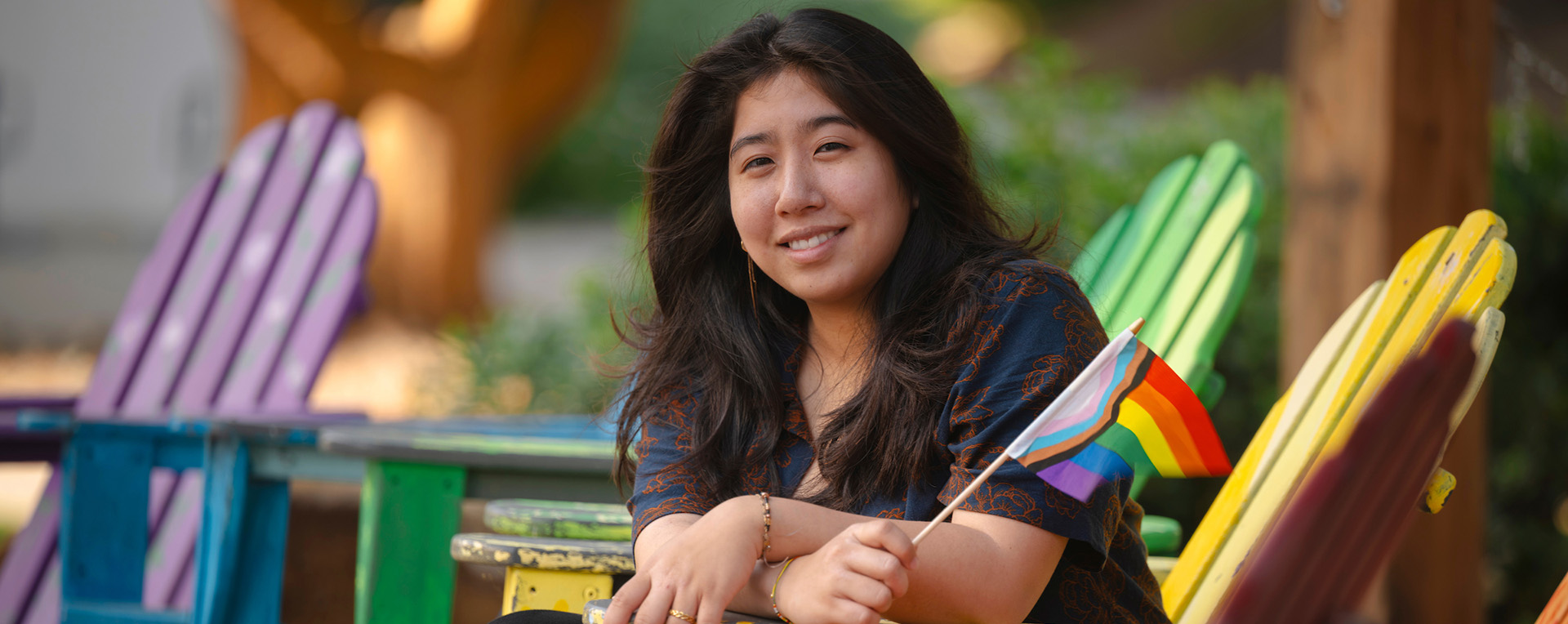
Julia Saldivar (she/they)
Julia Saldivar, a house advisor (HA) for the LGBTQIA+ Living and Learning Community (LLC) at Muir College, will soon embark on their fourth year at UC San Diego as an interdisciplinary computing and the arts major. For Saldivar, who says she didn’t feel particularly comfortable sharing her bisexual and nonbinary identities with roommates or classmates during her first year on campus, helping other students who are part of the LGBTQ+ community find belonging has also helped her become more confident in herself and more accepting of her own identities.
“It’s so important to have a safe space where you can talk to other people about what you’re feeling and feel seen—people who are willing to talk it through with you without shutting you down, and who celebrate each other’s wins,” says Saldivar.
That’s exactly the type of space Saldivar hopes to provide for students who are part of the LLC, which exists to provide a supportive residential environment that empowers students through educational programming, social community meetings, leadership opportunities and inter-community relationships.
“Pride means never being ashamed of who I am—and never being ashamed of other people who are living as themselves too. Pride means different things to different people, so it’s really about celebrating pride in all its forms and showing our support for one another.”
As an HA, Saldivar and their counterparts plan and coordinate social and educational events that help residents form bonds. From Queer Bingo and Drag Ball to beloved annual events such Muir Pride Week and the Lavender Reception to welcome new residents, there are ample opportunities for building community and connection and learning to listen to the unique experiences of others.
In mid-August, Saldivar will return to campus ahead of the fall quarter to get ready to welcome the newest incoming faces to the LLC. They look forward to fostering important conversations and continuing to make the residential space a place where Tritons feel valued and seen regardless of their backgrounds.
“In the LGBTQ+ community, people sometimes make assumptions that we all have the same lived experiences—like all of these ‘things’ happen to us if we’re queer,” says Saldivar. “I hope that having discussions and listening to each other opens students’ worldviews, to understand that not everyone has the same background and some people are affected differently by things. I really hope that it brings more community in the queer space."
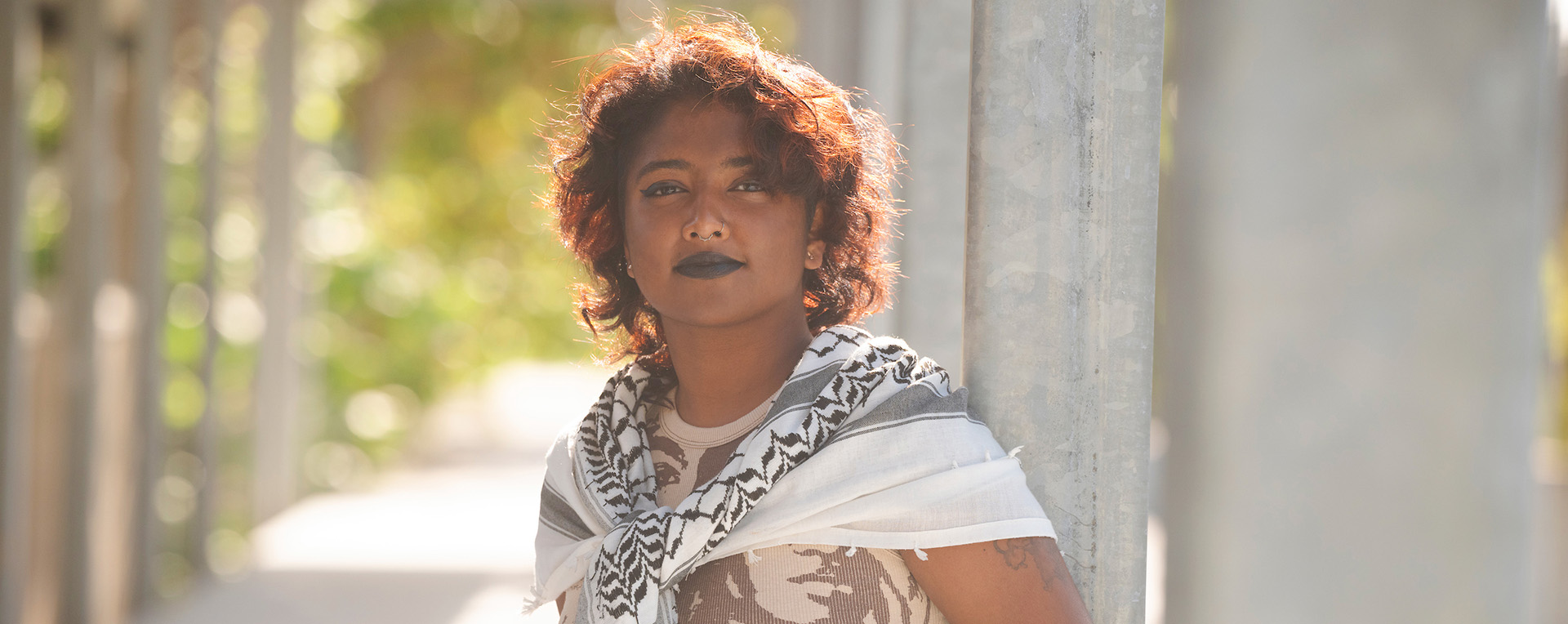
V Narredula (they/them)
For V Narredula, who will soon begin their fourth year in UC San Diego’s Revelle College, the intersection of their queer and South Asian identities influences the way they show up in the world. As a board member for Queer and Trans People of Color (QTPoC), a student-run organization on campus, Narredula and their counterparts aim to create spaces for students to explore their intersecting identities and find an avenue for building coalition and community.
“At QTPoC, our whole mission is to create spaces that are more holistically and radically accepting of people, no matter how they show up,” explains Narredula, whose major is cognitive and behavioral neuroscience. “QTPoC is not exclusive. We’re all trying to learn and we’re all trying to be better. It’s a ‘let’s tackle this together’ kind of vibe."
From events like QT Talks, which foster conversations about intersectionality and inclusivity, to “Home for the Holidays”—held each year before winter break to help equip students with coping mechanisms to deal with family members who may not be open to queerness or whose words or behavior may be triggering—QTPoC offers a broad range of programming that explores issues faced by people of color and the queer people in those communities who may be in need of particular resources or support systems.
“Pride for me is to be able to show up in spaces and express myself in the way that I feel comfortable and in a way that I feel happy and satisfied with. Pride is about being able to hold all my identities, all at once, and say ‘This is me—Here I am.’”
During the recent academic year, Narredula, who identifies as nonbinary and pansexual, helped support the creation of a QTPoC resource library, which provides information on queer health care and queer resources in the Greater San Diego community. They also worked to build the group’s relationships with other identity organizations on campus and helped bring a variety of educational programming to participants with what they describe as radical topics such as decolonizing the queer movement.
“We were able to create consistent educational spaces where students can come in and have those conversations they may not be able to have in regular everyday life or in classes,” Narredula shares proudly. “QTPoC is a great stepping stone to build bridges with people with different identities. Not just queer people, but also other people of color who want to learn about this. It’s an avenue for building relationships."
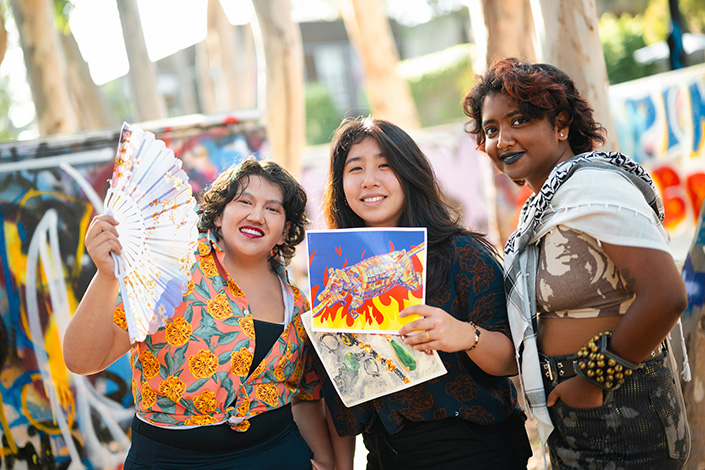
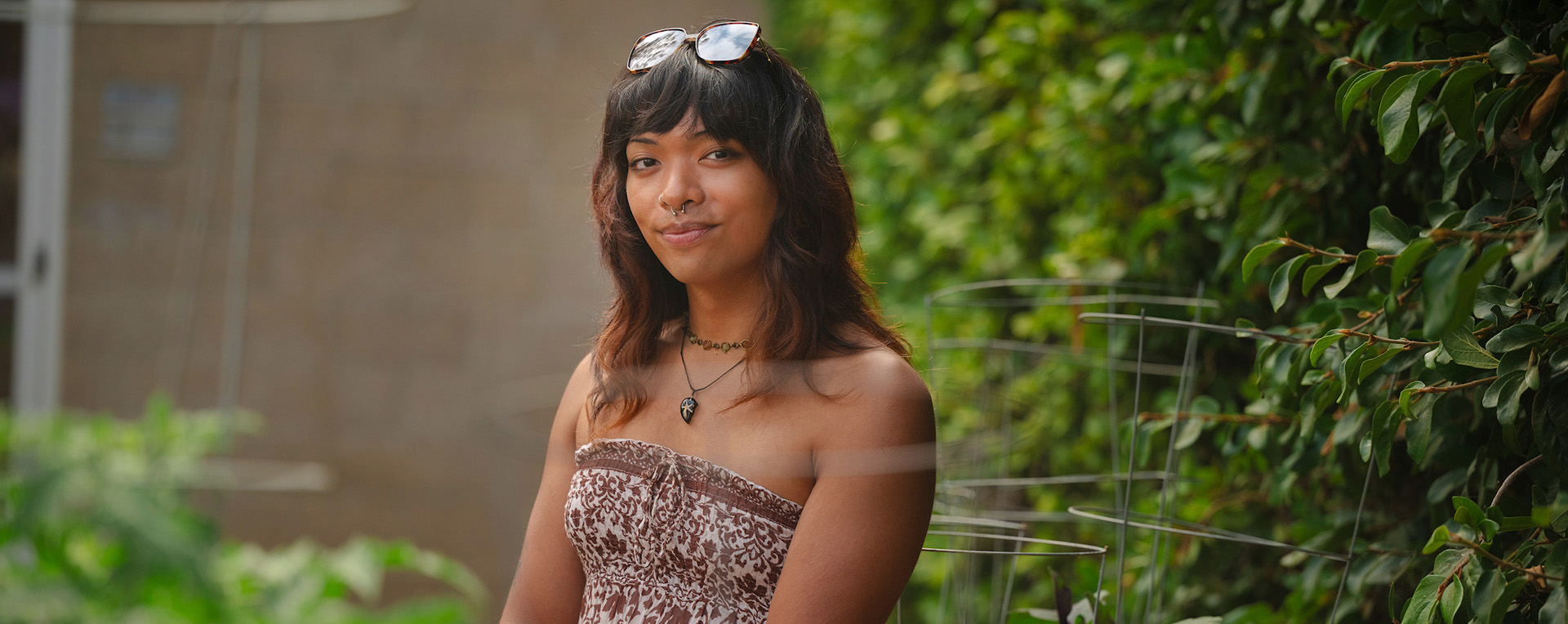
Kira Esguerra (she/they)
As a first-gen transfer student and immigrant from a low-income background, navigating higher education has admittedly been difficult for Kira Esguerra, who for the past academic year has served as the trans and nonbinary community education intern at the LGBT Resource Center.
“That’s not even to add all of the experiences I have with gender and sexuality,” says Esguerra, a sociology and critical gender studies double major who identifies as nonbinary and transfemme.
That’s why, when given the opportunity to launch a new Transfemme Group through the resource center, Esguerra jumped at the chance to create a space where other transfemmes on campus can build solidarity and community, talk about their own lived experiences and join in conversations about a variety of topics related to femininity and societal expectations. The group meets weekly at the Cross-Cultural Center, and Esguerra, who will be entering their final year at UC San Diego this fall, looks forward to seeing the group expand and continue to benefit those who participate.
What keeps Esguerra motivated to do this work on campus while juggling a demanding academic schedule and workload?
“I think of how much it improves someone’s well-being, and how little actions can have such immense impact,” says Esguerra. “Even just having conversations with folks or making some friends can really help improve someone’s quality of life, especially for trans and nonbinary queer folk in general.”
Esguerra says their role as a resource center intern bolstered their academic experience, allowing them to take theories and ideas from the classes they’re taking and apply them as they work to set up programs and educational events geared toward trans, nonbinary and gender diverse students. They’ve covered topics ranging from decolonizing ideas of gender and sexuality to exploring the works of queer Indigenous scholars and more.
This fall, Esguerra will continue to support the LGBTQ+ community on campus in a new position as a peer education intern with the university’s new Services for Trans, Intersex and Gender Diverse Experiences (STRIDE) program, which aims to provide holistic care, assistance with navigating health care and support when students encounter difficulties or barriers related to their gender identity. Esguerra says that the program also aims to expand the LGBT Resource Center’s gender-affirming closet—a clothing exchange that also includes makeup, trans supplies and more—to additional locations across campus.
For Esguerra, connecting with these groups and resources on campus has made all of the difference in adjusting to life at UC San Diego, particularly as a transfer student.
“You just feel less alone, and that translates to being able to do the things that you want to do,” says Esguerra. “Maybe it’s succeed in your classes, or participate in different organizations, or show up in whatever way what you want to with more confidence and self-assurance."
“Pride isn’t just a celebration of queerness. It’s not just about acceptance. My hope is that it’s more than that. Pride is challenging the ways that we think about gender and sexuality, including their intersections with race, class, immigration status, able-bodiedness and more. Once we are able to bring that into our awareness, it’s thinking of how we can change the systems we have now so that they are more inclusive of everyone.”
You May Also Like
Stay in the Know
Keep up with all the latest from UC San Diego. Subscribe to the newsletter today.



